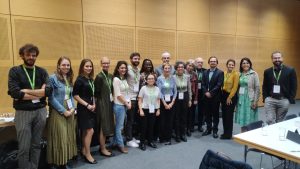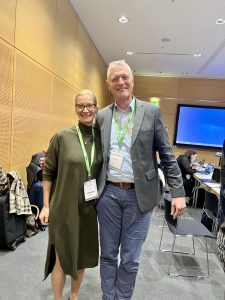Guest article by Lívia Nagy Bonnard, founding member of “Melletted a helyem Egyesület” – “Right(s) Beside You Association” in English – and a member of the Parent Advisory Board of EFCNI as well as a member of the Parent, Patient and Public Advisory Board of the ESCNH.
30th United European Gastroenterology Conference in Vienna
The 30th United European Gastroenterology Conference took place in Vienna at the beginning of October 2022. The aim of the conference was to discuss and share research results and best clinical practice examples as well as to deliver up-to-date educational trainings on topics relating to digestive health. But this was not the only theme of the conference. Participating medical societies ESPGHAN (European Society for Paediatric Gastroenterology, Hepatology and Nutrition) and UEG (United European Gastroenterology) also sought to expand the focus and to discuss more broadly a patient’s journey through the healthcare system.
This is why EFCNI, alongside other patient organisations, was invited to attend the inaugural meeting of a new “Transitional Care Forum” on 9 October 2022 during the aforementioned conference. The objective behind this forum was to discuss the key transitional care issues facing paediatric patients with gastrointestinal and liver conditions and to develop a consensus on a joint call to action. The call to action is to be shared with policy makers and healthcare providers across Europe over the next two years.
Establishing a “Transitional Care Forum”
Transitioning through paediatric and into adult care is a critical time for patients and, if not carried out appropriately, can impact education, mental health and other health outcomes. It has become clear that this is a major issue for patients, their carers, and clinicians and that the process of transition within and across Europe is in desperate need of reform.
While all the invited patient organisations outlined the key issues facing their particular patient community in transitional care, EFCNI was the patient organisation to highlight the importance of transitional care not only from paediatric to adult care but also after the birth period, i.e. from neonatal to paediatric care. This means that the patient community of preterm and hospitalised newborns needs not one but two transitions to arrive in adult care.

© Lívia Nagy Bonnard
Preterm babies face particular challenges
In fact, babies born preterm often face challenges with their digestion. The workings of their stomach and intestines are often also hampered. In term babies, all organs helping with digestion are developed while in the womb and then mature after birth along with the baby’s developmental stages. However, when born too soon, the surface of the small intestines is still too immature and cannot absorb properly all of the important nutrients the preterm baby receives. What is more, the preterm baby’s stomach is exposed already to bacteria and antigens before being mature enough to handle them. As participants in the forum highlighted, in these cases, a thorough prenatal assessment is important, meaning that the patient’s family history of genetic and congenital anomalies should be reviewed. Postnatal assessment is equally necessary.
Family members of a neonate with a gastrointestinal system disorder or anomaly often experience intense feelings of grief, loss, guilt, and confusion. They need further understanding and support in these challenging moments to empower them to move ahead and learn to manage these health issues.

© Lívia Nagy Bonnard
Transitional care for preterm babies is more complex
These challenges mean that transitional care for this patient group is more complex than in other cases. As patient advocates were quick to point out during the meetings, transitional care also includes the transition from hospital to home, meaning a transition from hospital care to primary healthcare for medical and follow-up care as well as, importantly, a transition for parents from caring for their baby in conjunction with the hospital staff to parenting on their own.
Hence, provision of care post-discharge must be carefully coordinated. An integrated team and an infant- and family-centred approach should be standard as it is vital for infant health and development. The time window is also a key element – families should be prepared for what comes after they leave the hospital from day one after birth.

© Lívia Nagy Bonnard
Empowering parents
Already while in hospital, parents should be empowered to master the transition from hospital to home, from hospital care to from neonatal care and then, later, to paediatric care. Parents should be competent primary caregivers for their baby by the time they leave the Neonatal Intensive Care Unit (NICU). To achieve this, education is a must, just like skin-to-skin practices and Kangaroo Mother Care. Parents should know how to change a nappy, how to feed their baby, and feel competent to do every other care procedure related to their baby’s condition.
A multidisciplinary team of experts and specialists should work with parents, including nutritionists, dieticians, development specialists, speech/language therapists, surgeons, ophthalmologists, and neurologists. Parents should know which check-ups are needed when, which treatments are to be continued, which medication is necessary, and how to get appointments in advance.

© Lívia Nagy Bonnard
Outlook
When it comes to gastrointestinal and liver issues, participants in the “Transitional Care Forum” agreed that more research was necessary, also to establish the benefits of parental involvement in caring for these patients as well as ensuring that the voices of patients and their families are considered during case management. During the meeting, participants agreed to set up a plan for action with achievable and realistic goals in order to deliver change. They even defined the first immediate actions to take. For instance, they decided to create an awareness day and are currently working to host an educational symposium during the ESPGHAN conference next year.

© Lívia Nagy Bonnard
During the meetings of the “Transitional Care Forum”, EFCNI was represented by Lívia Nagy Bonnard from the Hungarian patient association “Melletted a helyem Egyesület”.

© Lívia Nagy Bonnard

